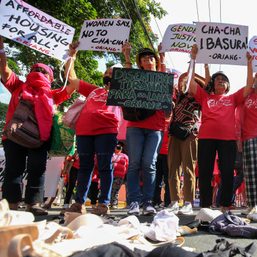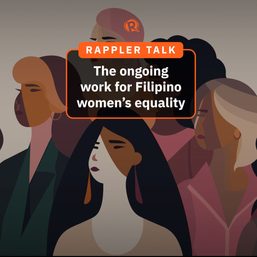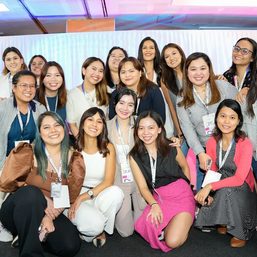SUMMARY
This is AI generated summarization, which may have errors. For context, always refer to the full article.
![[OPINION] The future of women at work](https://www.rappler.com/tachyon/2021/03/gender-covid-womensday.jpg)
We know automation and technological disruption will alter the world of work. Job losses due to COVID-19 have provided us a glimpse of who the winners and losers will be in the future of work.
We reviewed JobStreet’s COVID-19 Job Report, which summarized the jobs hardest and least hit by COVID-19 in the Philippines. The data painted a stark contrast between two types of workers, from which we created two personas to highlight their differences.
The worker most impacted by COVID is someone like Sandy, who is in her early twenties. She worked in hospitality for less than P20,000 a month, and was not yet a regular employee when she was retrenched. The worker least impacted by COVID is someone like Steve, an office worker in his late 30’s at a large IT company. He earns twice as much as Sandy and had smoothly transitioned to working from home. COVID-19 has thus highlighted the dividing lines of education, digital skills, and implicitly, gender.
Why this difference?
Despite many years of gender diversity advocacy, occupation clusters remain significantly gender-specific in both mature and emerging economies. This in turn has shaped the implications of pandemic job impacts on gender.
A McKinsey analysis showed that women have more than the average share of employment in three of the four most affected sectors, with the highest number of employment declines globally. As a result, the pandemic has pushed women out of the labor force more than men. Due to this concentration of women in the most affected sectors, women’s jobs are 1.8 times more vulnerable to the crisis than men’s. Shockingly, women make up 39% of global employment but account for 54% of overall job losses.
In the Philippines, for instance, women make up a higher percentage of those in service jobs, which by far was the most affected sector, accounting for 64% of all lost jobs in the Philippines, according to the Philippines Statistics Authority. The burden of unpaid care, which has risen in the pandemic due to schools being closed, also fell disproportionately on women and has largely been an unaccounted factor.
These impacts are occurring amid changing demands in skills — a trend set in motion prior to the pandemic. By 2022, at least 54% of all employees will require significant reskilling and upskilling. The half-life of a job skill today is about five years — and decreasing. Even before the pandemic, 40% of the seven million workers at risk of displacement in ASEAN were “acutely lacking” the IT skills new jobs needed. As the COVID-19 pandemic accelerates the digital economy, we can expect the changing demand for digital skills to become even more pronounced.
While those working in STEM may be at an advantage going forward, most are men. Women hold 56% of university degrees globally, but just 36% of them have STEM degrees, and only 25% of them are in the STEM workforce. This gender gap in STEM has been the subject of study and debate, with reasons ranging from a lack of role models and support, to perceptions of what STEM careers and workplaces look like. However, if urgent actions are not taken by educators, companies, and policymakers, we risk regressing on the advancement already made on gender equality at work.
Could COVID-19 be the catalyst to get more women into STEM?
What is good for greater gender equality is also good for the economy and society as a whole. Recovery efforts that invest in the female workforce include removing gender imbalances by recognizing and taking on unpaid work and child care, and removing barriers to women’s digital and financial inclusion and entrenched attitudes about women’s role in society.
One area of action that we have taken as an online data upskilling school is to offer targeted reskilling for women. Eskwelabs worked with FHMOMs, an online community of 300,000+ Filipino moms, as the pandemic was unfolding in 2020, to deliver targeted upskilling to women who are freelancing online, often part-time while they tend to childcare duties. By upskilling with data skills, these women can qualify for more high-value and highly paid work as compared to competing in a crowded virtual assistant market.
We are now working to scale up beyond the pilot of a few hundred moms to reach 10,000 women and democratize the many possible pathways to resilient and fulfilling careers.
Instead of allowing digital disruptions to leave women behind, targeted reskilling is one clear way to flip the odds and drastically speed up progress on diversity — a strategy that will be good for women and crucial for thriving societies. – Rappler.com
Angela Chen is Co-Founder and CEO of Eskwelabs, an edtech startup reimagining the vocational school, with the mission of democratizing access to the future of work for those from diverse backgrounds through data skills education.
Add a comment
How does this make you feel?
![[ANALYSIS] Pandemic pushes Filipinos out of labor force, especially women](https://www.rappler.com/tachyon/2020/12/tl-1.jpg?fit=449%2C449)










There are no comments yet. Add your comment to start the conversation.